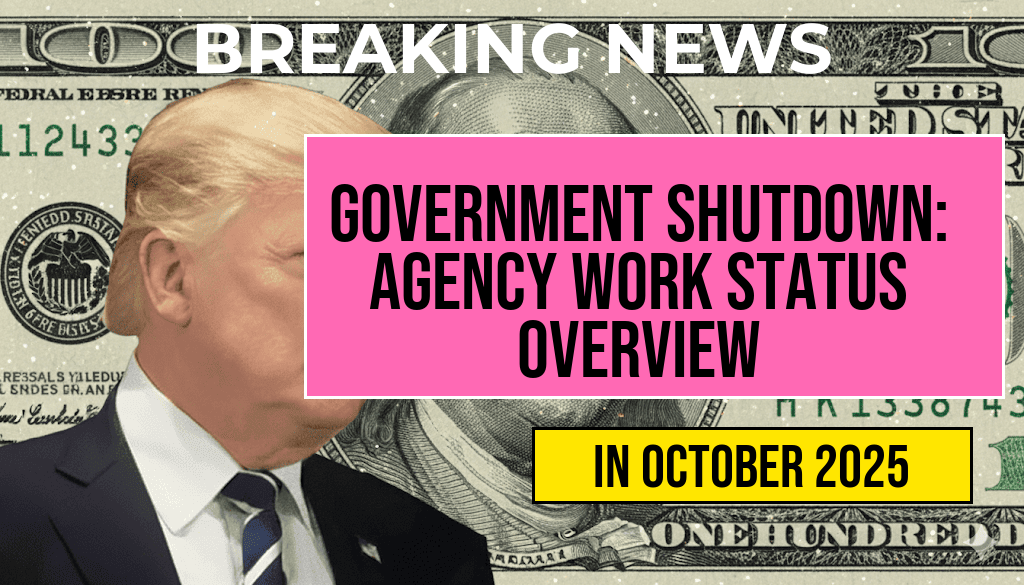The looming threat of a government shutdown has prompted widespread concern across various sectors, affecting everything from essential services to financial transactions. As lawmakers struggle to reach a resolution, many agencies face operational changes that impact millions of Americans. The following overview provides clarity on who is still working and who is not, detailing the status of key agencies including the Social Security Administration, the Internal Revenue Service (IRS), the Department of Defense, and the Transportation Security Administration (TSA). Understanding these shifts is crucial for citizens relying on government services, especially during a time of uncertainty.
Social Security Administration
The Social Security Administration (SSA) will continue to process Social Security benefits, with most employees considered essential. However, new claims and customer service operations may experience delays. The SSA urges beneficiaries to utilize online services whenever possible to minimize disruption.
Internal Revenue Service
The IRS faces significant limitations during a shutdown. While some essential functions, such as processing tax refunds, may continue, many employees will be furloughed. As a result, taxpayers should expect delays in customer service and processing times for returns. The IRS has advised that taxpayers utilize electronic filing methods to expedite processing.
Department of Defense
The Department of Defense (DoD) will maintain operations, with military personnel continuing their duties without interruption. However, many civilian employees may be furloughed, affecting support services and non-essential programs. The DoD has emphasized its commitment to national security remains uncompromised.
Transportation Security Administration
The TSA will operate normally during a shutdown, as airport security remains a critical function. Most TSA employees are considered essential and will continue to screen passengers and luggage. However, any new hiring or training initiatives may be put on hold.
Department of Education
The Department of Education will see a significant impact, with many employees furloughed. While federal student loans and Pell Grants will continue to be processed, oversight and new program implementations may experience delays. The department has advised schools and institutions to prepare for possible disruptions.
Federal Housing Administration
The Federal Housing Administration (FHA) will maintain essential functions, but processing of new loan applications may slow down. With a reduced workforce, delays in approvals and customer service are anticipated.
Food and Drug Administration
The Food and Drug Administration (FDA) will continue its core functions related to public health, but routine inspections and non-critical activities may be curtailed. The agency has assured that food safety and drug approvals will remain a priority.
National Park Service
The National Park Service (NPS) will close many parks and facilities during a shutdown, impacting tourism and recreation. Essential maintenance staff may remain on duty, but visitor services will be severely limited.
Impact on the Public
The implications of a government shutdown extend beyond agency operations. Citizens relying on government services may face delays in benefits, tax refunds, and other essential services. It’s advisable for individuals to stay informed and manage expectations during this uncertain period.
| Agency | Status | Impact on Services |
|---|---|---|
| Social Security Administration | Operational | Delays in new claims and customer service |
| Internal Revenue Service | Partially Operational | Delays in processing returns and customer service |
| Department of Defense | Operational | Furloughs among civilian staff, military operations unaffected |
| Transportation Security Administration | Operational | No interruptions in airport security services |
| Department of Education | Partially Operational | Delays in oversight and new programs |
| Federal Housing Administration | Partially Operational | Slow processing of loan applications |
| Food and Drug Administration | Operational | Limited routine inspections |
| National Park Service | Closed | Limited visitor services and park closures |
As the situation evolves, individuals are encouraged to stay updated through official government channels and news outlets. More information can be found on the [U.S. Government Shutdown Overview](https://en.wikipedia.org/wiki/Government_shutdown) and [IRS Official Site](https://www.irs.gov). The continued negotiations in Congress will ultimately determine the length and severity of this shutdown, impacting federal employees and the public alike.
Frequently Asked Questions
What happens to Social Security services during a government shutdown?
During a government shutdown, Social Security services typically continue to operate as they are funded by mandatory spending. Benefit payments are generally unaffected, and essential services like processing new applications may still be processed, although some non-essential services may be delayed.
Is the IRS still operational during a government shutdown?
During a government shutdown, the IRS may be significantly affected. Most of its employees are furloughed, which can lead to delays in processing tax returns and refunds. However, some essential functions, such as processing payments, may continue.
How does a government shutdown impact Defense operations?
Defense operations are generally considered essential, so many military personnel and critical functions remain operational during a government shutdown. However, certain support staff and non-essential functions may face furloughs.
Will TSA airport security personnel still be working during a government shutdown?
Yes, TSA personnel are considered essential workers, so airport security operations will continue during a government shutdown. However, there may be challenges in staffing levels if the shutdown is prolonged.
How does a government shutdown affect federal employees?
During a government shutdown, many federal employees are furloughed, meaning they are temporarily laid off without pay. Essential workers may still report to work but may face uncertainty regarding their pay until the shutdown is resolved.

Leave a Reply